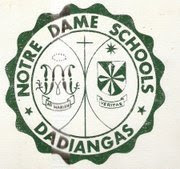
[Blog Ed's Note: We are featuring here an article on NDD Boys Department Batch '73 Valedictorian, Roberto Cruz's latest project.]
MANILA (AFP) — The rugged Willy Jeep has been given a new lease of life by a small factory in Manila reproducing the iconic World War II vehicle for a growing international market nostalgic for the past.
The company, MD Juan, exports about 95 percent of its output to collectors mainly in the United States and Europe who still treasure the veteran vehicle said to have been the backbone of the US army during World War II.
Plant manager Roberto Cruz says American collectors want their jeeps as authentic as possible -- complete with imperfections and outdated materials such as wood and rubber instead of more durable plastic.
"The purists, they want it correct to the smallest detail," he told AFP.
"If you make the body too nice, they don't like it. They ask, 'where is the spot weld part here?'" he said.
MD Juan moves around 1,500 units a year, most of them on order but the engines are usually left to the buyer.
European and American collectors also prefer to have carefully-restored original jeep engines installed in their vehicles, says Cruz, adding however that his company cannot motor restoration.
The few Filipino collectors are content just to install a modern Toyota or Isuzu engine in their vehicles to produce a jeep that only looks authentic from the outside, says Cruz.
"They would laugh at such jeeps in the US," he says. "We don't sell running units. If we did, whatever profit we make would be eaten up by warranty claims."
He declined to say how much he sells them for but said a fully-restored jeep sold recently on the E-Bay Internet auction site for 30,000 dollars.
"Most of the buyers are veterans who have a romance with the jeep," he says.
But there are also younger collectors who are entranced with the wartime history of the vehicle. "Everywhere America fought" there are people who remember the jeep," says Cruz.
"It was the original 4X4 vehicle, the original all-terrain vehicle."
The US produced more than 600,000 jeeps during World War II and it played a crucial role in both the Pacific and European theatres ranging from simple people mover to weapons carrier.
The squat, box-like vehicle garnered a huge following for its rugged durability, low cost and widespread availability.
Allied commander and later US president Dwight Eisenhower said the jeep was crucial to the Allied victory in World War II.
Nor is it surprising that a Philippine company should specialise in replicas of these jeeps as they played a crucial role in land transport in this country.
After World War II, as a newly-independent Philippines was recovering from wartime devastation, US surplus jeeps were often the only form of automotive transport available to many Filipinos.
Enterprising Filipinos extended the bodies of the jeeps, added seats, a fixed roof and gaudy decorations to produce the jeepney, a mini-bus that is still a cornerstone of commuter transport here, as well as a symbol of the Philippines itself.
Maximiano D. Juan, the founder of MD Juan, started his company in 1966 importing jeep parts for the jeepneys. As the supply of surplus parts dried up and more jeepneys switched to using imported Japanese auto engines, he had to find a new niche.
Company vice president Raphael Juan, grandson of the founder, says the same people who once supplied his grandfather with surplus jeep parts asked if he could provide reproduction parts for their vintage jeeps.
This led the company to set up a stamping factory that eventually grew to making various parts for those wanting to restore their old jeeps.
Rapahel Juan says about 80 percent of its jeeps are exported to the United States with 20 percent going to other countries. France and the Netherlands are two other big buyers where local enthusiasts want vehicles that look just like World War II originals.
Although nostalgic World War II veterans may be passing away, the market for the jeeps does not seem to be getting any smaller.
"Recently, when we went to a jeep convention in Lodi, California we noticed there were new enthusiasts in the market who are younger," Juan said.
The company has also gone into jeep-oriented ventures, making small jeep bodies in which the hobbyist can install a lawnmower or golf cart engine to produce a jeep a child can drive.
MD Juan has also been contracted by Greenpeace to build the bodies for a fleet of electric-powered jeepneys that local governments are promoting as an environmental alternative to the smoke-belching originals.
Another project is the "tourist jeep"-- a bus-sized vehicle with all the amenities of a luxury tourist bus but with the colourful exterior of a jeepney.
Cruz says the company is hoping tour agencies, resorts and hotels will buy these tourist jeeps to add some local colour to their services.
Some people have even asked if MD Juan could expand into making reproduction bodies for vintage roadsters, though Cruz says this would be too difficult.
But after some hesitation, Raphael Juan says with a smile: "We're studying the market for that."










No comments:
Post a Comment